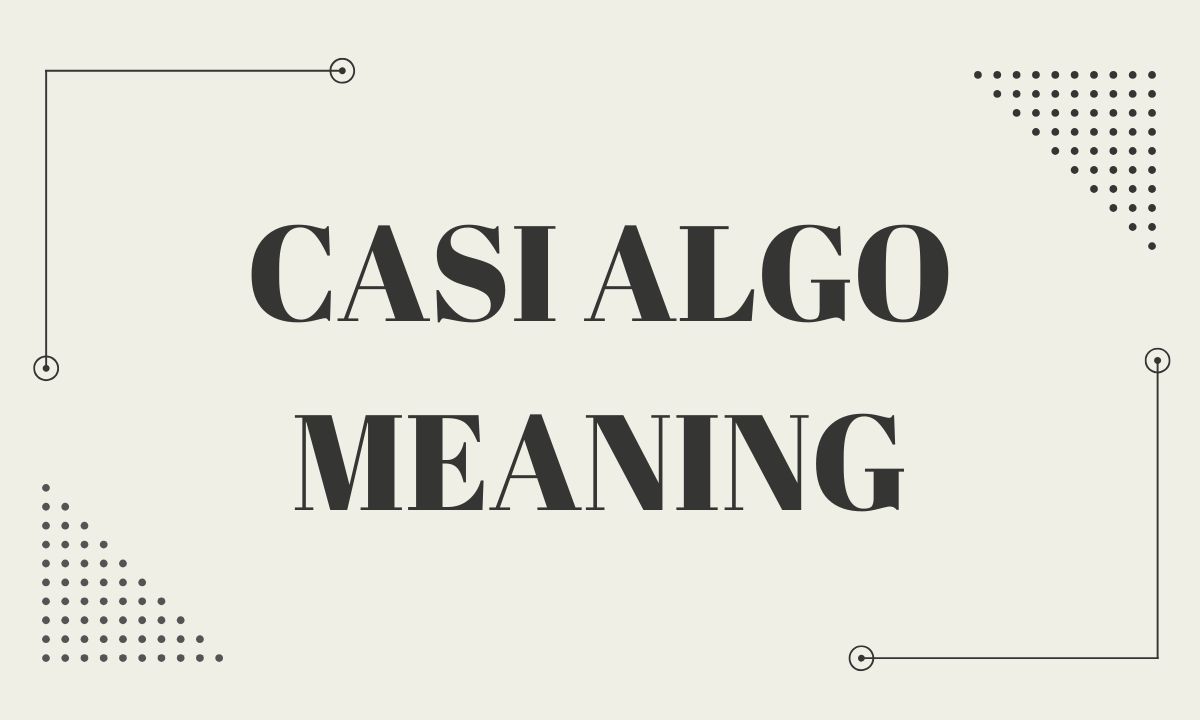Casi Algo Meaning has become a trending phrase on social media and among English speakers learning Spanish. Literally translating to “almost something,” this expression holds a deeper emotional and cultural connotation. It describes relationships that almost became something more those “what could have been” situations that linger between friendship and love.
In this article, we’ll uncover the true meaning, origin, usage examples, emotional context, and modern interpretations of Casi Algo, while comparing it to similar Spanish phrases and providing practical ways to use it in real-life conversations.
What Does “Casi Algo” Mean in Spanish?
The phrase “Casi Algo” is a combination of two Spanish words:
- Casi – meaning almost
- Algo – meaning something
When put together, “Casi Algo” means “almost something.”
However, its cultural meaning extends far beyond this literal translation. It’s commonly used to describe a situationship when two people share emotions or chemistry but never officially become a couple.
| Spanish Phrase | English Translation | Context |
| Casi algo | Almost something | Unofficial relationship |
| Amor imposible | Impossible love | A love that can’t happen |
| Amistad especial | Special friendship | Between friendship and romance |
Emotional and Cultural Significance
The emotional weight of “Casi Algo” is what makes it so powerful. It reflects unspoken feelings, missed opportunities, and emotional gray zones.
In Latin cultures, people use “Casi Algo” to talk about relationships that were meaningful but undefined the ones that hurt not because they ended, but because they never really began.
💬 “Éramos casi algo, pero nunca lo fuimos de verdad.”
(We were almost something, but never really were.)
This phrase has gained global popularity due to its relatable emotional undertone, often appearing in TikTok captions, Instagram posts, and Spanish pop songs.
Casi Algo in Modern Conversations
In today’s world of online dating and complicated emotions, “Casi Algo” perfectly captures the essence of a situationship.
People use it when describing a bond that lacks official labels yet feels emotionally deep. It represents the modern generation’s struggle with commitment, where connection and confusion coexist.
Examples in Sentences
- “Lo nuestro fue un casi algo que dolió más que un adiós.”
(Ours was an almost-something that hurt more than a goodbye.) - “No sé si éramos pareja o amigos; sólo sé que fuimos un casi algo.”
(I don’t know if we were a couple or friends; I just know we were almost something.)
Casi Algo vs Situationship: Are They the Same?
Both terms describe undefined relationships, but they carry slightly different cultural tones.
| Term | Language | Emotional Tone | Description |
| Casi Algo | Spanish | Poetic & emotional | A bond that almost became love |
| Situationship | English | Modern & casual | A relationship without labels |
So while “Casi Algo” may align with “situationship,” it’s often more heartfelt, rooted in nostalgia and emotion.
Common Misinterpretations of “Casi Algo”
Many non-native speakers misinterpret Casi Algo as a casual phrase when, in reality, it’s often used in serious emotional contexts.
It’s not just “flirting” or “talking.” Instead, it’s a phrase that conveys emotional attachment without formal acknowledgment.
Common Mistakes to Avoid
- ❌ Using it for platonic friendships
- ❌ Confusing it with “Casi Nada” (which means “almost nothing”)
- ❌ Translating it too literally without context
The Psychology Behind “Casi Algo” Relationships
From a psychological point of view, “Casi Algo” situations often stem from emotional avoidance, fear of vulnerability, or mismatched timing.
People involved in a Casi Algo experience:
- Emotional investment without clear boundaries
- Unspoken expectations that lead to confusion
- Long-lasting emotional residue
Case Study Example:
In a 2023 online relationship survey, 42% of participants admitted to being in a “Casi Algo” phase feeling emotionally involved without defining the relationship.
This shows that the phrase is not just cultural it’s a universal emotional experience.
Casi Algo in Pop Culture and Social Media
“Casi Algo” has become a viral trend across platforms like TikTok, Instagram, and X (formerly Twitter).
It’s used in:
- Captions and memes about “almost relationships”
- Song lyrics in Spanish pop and reggaeton
- Spanish-English romantic quotes
Popular References
- 🎵 “Fuimos casi algo, pero eso ya no importa” lyric from a trending Spanish song.
- 💔 Hashtag #CasiAlgo has over 80M views on TikTok in 2025.
How to Use “Casi Algo” Naturally
Here’s how to use the term appropriately:
- When reminiscing:
“Él fue mi casi algo del verano pasado.”
(He was my almost-something from last summer.) - When explaining emotions:
“Me duele más nuestro casi algo que cualquier ruptura.”
(Our almost-something hurts more than any breakup.) - When posting online:
“#CasiAlgo when love almost happens but doesn’t.”
Linguistic Note: Grammar and Syntax
From a linguistic perspective, “Casi Algo” follows a simple structure:
- Casi (Adverb) + Algo (Pronoun) = “Almost Something”
It’s grammatically correct, but its figurative meaning depends on context it’s not taught in formal Spanish grammar books but used widely in modern conversational Spanish.
Related Spanish Phrases and Their Meanings
| Phrase | Literal Meaning | Emotional Usage |
| Amor platónico | Platonic love | Unfulfilled love |
| Amigo con derechos | Friend with benefits | Casual relationship |
| Amor pasajero | Passing love | Short-term romance |
| Casi amor | Almost love | Incomplete affection |
These expressions often overlap with “Casi Algo” in tone but differ slightly in emotional depth and intent.
The Rise of “Casi Algo” Among English Speakers
Over the last few years, English-speaking audiences have increasingly adopted the phrase “Casi Algo” in online conversations. It’s now common to see it used in Instagram captions, tweets, and TikTok trends, especially by people discussing unlabeled relationships or emotional nostalgia.
This linguistic crossover shows how bilingual expressions can bridge emotional experiences across cultures. Even those who don’t speak Spanish use “Casi Algo” because it sounds poetic and heartfelt something that English doesn’t easily capture with one phrase. It’s proof that language evolution often follows emotion, not grammar.
How “Casi Algo” Reflects Modern Relationship Culture
The concept of “Casi Algo” fits perfectly into the 21st-century relationship landscape. Today, many people experience deep emotional connections without official titles thanks to online dating, social media, and the rise of situationships. This phrase gives a name to that in-between space where love and uncertainty meet.
It captures the emotional ambiguity of modern love, where people crave connection but fear labels. “Casi Algo” doesn’t just describe a status; it mirrors our generation’s shift toward emotional complexity, vulnerability, and the blurry lines between romance and friendship.
Why “Casi Algo” Resonates So Deeply with Gen Z
Among Gen Z, “Casi Algo” has become more than just a phrase it’s a symbol of emotional honesty. Unlike previous generations, Gen Z openly discusses feelings of confusion, heartbreak, and “almost” relationships.
The phrase’s popularity reflects their willingness to confront emotional gray zones instead of hiding them. In digital spaces, Gen Z uses “Casi Algo” to express heartbreaks that never had official beginnings relationships that were real emotionally but invisible socially. This emotional transparency makes “Casi Algo” not just a phrase, but a modern cultural expression of love, loss, and identity.
Conclusion
“Casi Algo Meaning” goes beyond a simple Spanish translation. It reflects the modern complexity of relationships, where emotions exist without clarity and love lingers in the “almost.”
Whether you’ve lived a Casi Algo moment or are just curious about its meaning, it’s a reminder that not all connections need labels to feel real.
So next time you hear “Casi Algo,” remember it’s not just Spanish. It’s a feeling that speaks every language. 💔








